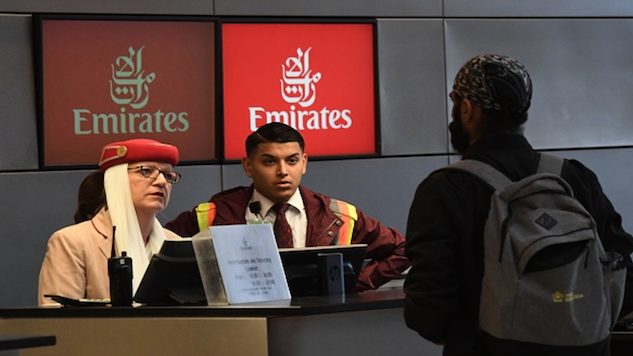As if traveling to the U.S. from halfway across the world weren’t mundane enough, travelers to the U.S. from eight countries—all Muslim-majority, mind you—in the Middle East, North Africa and Europe will have to do it without the assistance of any electronic item larger than a cell phone.
The latest edict rolled out by the Trump administration forbids all passengers, traveling from the 10 affected airports, from bringing laptops, tablets, that old DVD player from 2002, large cameras, even a god-forsaken Walkmen or any other electronic item larger than a cell phone into the airplane cabin.
Instead all such electronics must be checked.
The moves come as the U.S. government is “concerned about terrorists’ ongoing interest in targeting commercial aviation,” the Department of Homeland Security (DHS) stated. “Evaluated intelligence indicates that terrorist groups continue to target commercial aviation, to include smuggling explosive devices in various consumer items [like your iPad Mini].”
Incidents like the armed attacks against airports in Brussels and Istanbul, along with the 2015 airliner downing in Egypt and the attempted 2016 downing in Somalia, have played a role in instituting the ban, according to DHS.
The ban begins March 25 and will “remain in place until the threat changes,” according to the DHS, and more airports may be added in the future.
In total, the measure will affect nine airlines in 10 airports in seven countries.
The inflicted airports include:
Mohammed V International, Casablanca, Morocco
Ataturk Airport, Istanbul, Turkey
Cairo International Airport, Egypt
Queen Alia International, Amman, Jordan
King Abdulaziz International, Jeddah, Saudi Arabia
King Khalid International, Riyadh, Saudi Arabia
Kuwait International Airport
Hamad International, Doha, Qatar
Abu Dhabi International, United Arab Emirates
Dubai International, United Arab Emirates
The carriers—Royal Jordanian Airlines, Egypt Air, Turkish Airlines, Saudi Arabian Airlines, Kuwait Airways, Royal Air Maroc, Qatar Airways, Emirates and Etihad Airways—serve the U.S. about 50 times per day and have until Friday to adopt the new policy.
The electronic travel ban is not-so-surprising considering the President’s rhetoric concerning Muslim-majority countries. What is surprising, though, is that this move directly impacts the travel habits of long-time U.S. allies. Turkey is perhaps the country’s most important ally in fighting the Islamic State. The U.S. was the UAE’s third ever ally, and 50,000 Americans currently reside in Dubai and Abu Dhabi. And Morocco was the first country to recognize U.S. independence in 1777—one of our nation’s first allies
This isn’t just a ban on nations with whom the U.S. shares a tense relationship. It’s a ban on friends. And it’s a ban that largely affects Muslims.
Tom is a travel writer, part-time hitchhiker, and he’s currently trying to imitate Where in the World is Carmen Sandiego? but with more sunscreen and jorts.
